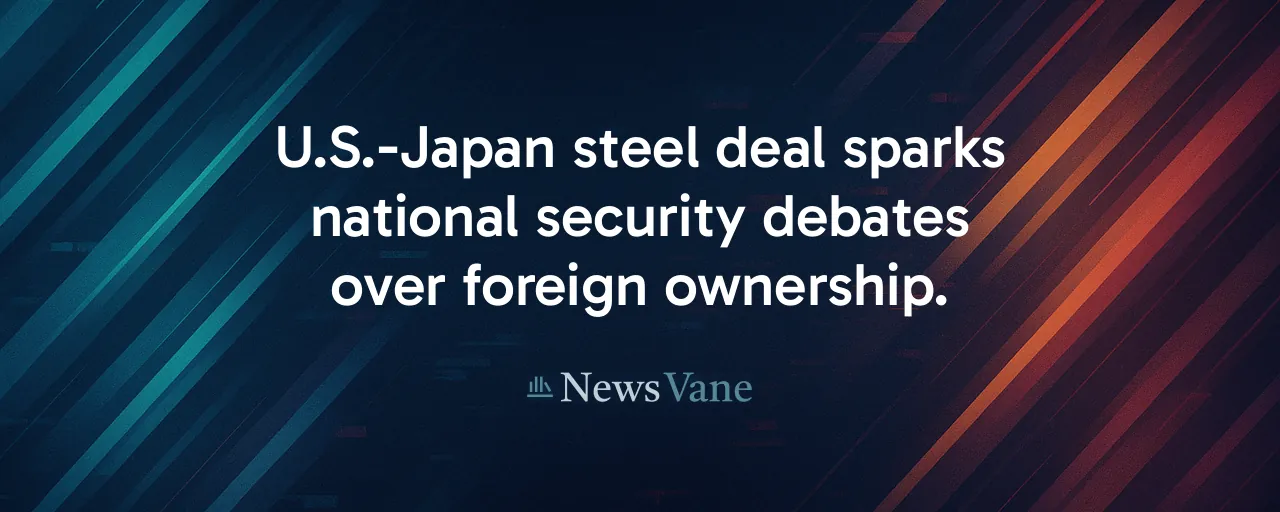A Deal That Sparked Debate
When Nippon Steel, a Japanese company, offered $14.9 billion for United States Steel Corporation in December 2023, the proposal seemed like a straightforward business move. Yet it quickly became a focal point for Washington's scrutiny. The Committee on Foreign Investment in the United States (CFIUS) launched a review to assess whether foreign ownership of a major steel producer posed risks to national security.
The timing intensified the stakes. With global tensions rising and a renewed focus on protecting domestic industries, the deal touched a nerve. Steel carries weight beyond its market value, tied to defense, infrastructure, and economic resilience. Could a trusted ally like Japan be allowed to control such a critical asset? The question gripped policymakers and workers alike.
The Biden administration halted the deal in January 2025, citing security concerns. By May, however, President Trump's administration reversed that decision, approving the acquisition with stringent conditions. This shift underscores the intricate balance of economic gain, national security, and international relations at play.
The Strategic Value of Steel
Steel underpins industries vital to national interests, from building bridges to equipping the military. The Pentagon depends on it for everything from warships to missile silos, while infrastructure projects consume vast quantities. United States Steel, a century-old titan, embodies industrial strength, extending its value beyond mere profit. Foreign control raised fears of supply disruptions in a crisis.
Supporters of domestic steel protection argue that reliance on foreign owners risks weakening defense readiness. Policies like Section 232 tariffs, which slap duties on imports to bolster local production, and 'melt-and-pour' rules for federal projects aim to keep steel American-made. These measures reflect a belief that economic security ties directly to national survival.
Nippon's offer, however, brought promises of $14 billion in upgrades, job retention, and preserving U.S. Steel's Pittsburgh base. Some policymakers viewed this as a chance to modernize the industry while safeguarding employment. The challenge lay in ensuring these benefits without surrendering strategic oversight.
Navigating Risks and Rewards
CFIUS, led by the Treasury Department, scrutinized Nippon's proposal with care. Its January 2025 block under President Biden reflected caution about foreign control. After Trump's inauguration, a fresh review signaled openness to allied investment. By May, CFIUS greenlit the deal, but only if Nippon and U.S. Steel signed a national security agreement (NSA).
This agreement imposes tight controls. It grants the U.S. government a 'golden share,' giving veto power over decisions like factory closures or board appointments. Ongoing monitoring ensures compliance, reflecting a commitment to protect U.S. interests. The deal can proceed, but under a watchful eye, showing the lengths taken to balance opportunity with caution.
The decision ties to broader policy. The Trump administration's 'America First Investment Policy' prioritizes fast reviews for allies while blocking deals linked to adversaries like China. Diplomatic talks with Japan's Prime Minister Ishiba also smoothed the path, highlighting how alliances shape economic choices.
Diverse Perspectives Weigh In
The deal faced pushback. The United Steelworkers union, representing thousands, demanded firm job protections, skeptical of Nippon's pledges. Cleveland-Cliffs, a competing U.S. firm, argued the steelmaker should remain American-owned, fueling legal challenges. Their concerns reflect deep unease about foreign influence over a bedrock industry.
Economists highlighted economic ripple effects. Restrictions on foreign investment could push steel prices higher, with hot-rolled coil projected to reach $950 per ton in 2025, up 19 percent year on year. This could strain industries like car manufacturing and raise consumer costs. Conversely, proponents of the deal argue that allied investment, paired with safeguards, boosts the economy without compromising security.
Global trade experts flagged risks of escalation. Tight investment rules or tariffs might provoke retaliation from allies, as seen in 2018 when U.S. duties sparked EU and Canadian countermeasures. Yet those backing the NSA believe it offers a practical solution, allowing Japan's capital to flow while keeping U.S. priorities intact.
What Lies Ahead
The Nippon-U.S. Steel deal reveals how national security now drives economic policy, with the focus shifting to ensuring industries remain reliable in uncertain times. The golden share approach, inspired by European models, may guide future deals, blending openness to investment with robust oversight.
Challenges persist. Legal battles from unions or competitors could disrupt the deal. Rising steel prices might pressure downstream sectors, while allies may bristle at stricter U.S. investment rules. These uncertainties will test the balance between global markets and national interests.
For now, the deal advances, a case study in navigating complex priorities. It signals that in a world of competing demands, economic decisions carry weight far beyond the balance sheet, shaping security, jobs, and alliances for years to come.
